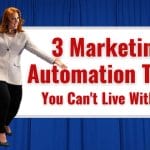Since I’ve started taking about objections, I want to spend some time talking about a big, common, objection that you most certainly trip over on a daily basis: “I’ve already got someone just like you supporting my network.”
Good marketing is not just about selling the benefits of outsourcing IT support. If you are correctly targeting the right types of prospects (see earlier commentary on this) many of the companies you market to will already have someone who is supporting their network or supplying them with the products and services you offer. To secure that prospect’s business, you have to knock their current provider off their perch – and you can’t do it by slandering them. Instead, you have to ATTRACT the buyer away from their current provider by offering to solve problems or frustrations they have with their current vendor, or by offering a level of service they want but aren’t getting. Note: this is the whole premise of the “Bad Date” letter I’ve included as Marketing Example #3.
That is why your marketing needs to communicate exactly why a prospect would want to hire you over their current provider; this is also known as a USP or unique selling proposition, and if you’ve been a client of mine for any time, you know that I constantly talk about the importance of it when marketing your company. But before you can market a USP, you have to HAVE one.
In the IT industry, most companies compete on one of three levels: price, product, or service. If you have a product or a service that is truly unique to you AND it has a high perceived value to your target market, then that is your unique selling proposition. Even then, unless you have an airtight patent on the product or service, it won’t be long before your competition starts offering their own version of it.
This means your USP will be short- lived. Managed services is a good example of this. Right now, most VARs are not actively offering this to their clients. If you are, this gives you a slight advantage over the competition; but it’s only a matter of time before the other VARs in your market catch on or before a large vendor like Microsoft or Dell starts marketing it on a massive scale.



